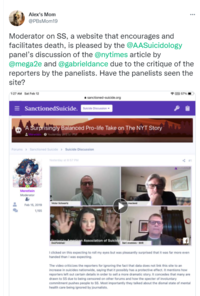It is refreshing to see "experts" who are able to see through the deceptive and manipulative storytelling prevailing the external, agenda-driven narratives surrounding SS.
I watched the video. Some very good points here. I like that they make a point that censorship is not helpful. I also found it interesting the point that is made about how the conventional wisdom about safe reporting guidelines for news relating to suicide is pretty much completely bunk, and actually seem to do the opposite of what they're intended to do (i.e. decrease the "risk" of suicide.) I also liked the not so subtle digs at the DSM (Diagnostic and Statistical Manual of Mental Disorders).
Ultimately most efforts to "protect people from themselves" end up violating personal autonomy and cause harm themselves far more than they do any protecting or helping. As we are all aware it is not accurate to say that SS is something that will only or always lead to someone killing themselves in the same way it is not accurate to say that watching some TV show where someone kills themself will lead to their suicide. (And even if it did, these things should still be allowed to exist.)
"The narrative is more important than the facts." I couldn't have said it better... Why didn't the NYT do a story on how shitty mental health care is or how most health care professionals aren't equipped to deal with suicide? (To paraphrase what was said in the video.) Because that's not a story that sells. That's boring and mundane and not actionable for the average media witch hunt. "SCARY SUICIDE WEBSITE, CHILDREN PUSHED TO KILLING THEMSELVES WITH CHEMICAL FROM POPULAR ONLINE RETAILER" is, though. Now you have a clear target and clear goal, to shut this place down, and pat yourself on the back for feeling like you're a good person because you got rid of something because you couldn't stop to try and understand it. It feeds into people's base instincts and emotions and bypasses logic and reasoning.
Social safety nets and healthcare are far more important and effective to preventing suicide than banning or censoring details or methods or websites. The involuntary commitment of the suicidal definitely hurts more people than it helps. But that is rarely talked about, because that would prevent grand sweeping changes to the structure of how suicidal intent is dealt with that people don't want to face, because it isn't an easy conversation with easy answers. It makes people uncomfortable. So suicide gets swept under the rug, only pulled out from the shadows when ire and rage is directed toward it (in the case of this website). Silencing people doesn't help.
Unfortunately unless people are willing to enact some real social, societal and structural changes, we will continue in this sad state we're in.

